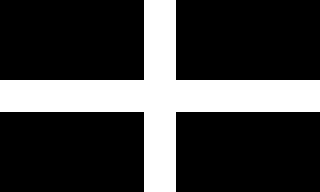
The subdivisions of England constitute a hierarchy of administrative divisions and non-administrative ceremonial areas.
The pattern of local government in England is complex, with the distribution of functions varying according to the local arrangements.
As a geographical entity distinct from the mainland, the Isle of Wight has always fought to have this identity recognised. The Isle of Wight is currently a ceremonial and Non-metropolitan county and as it has no district councils it is effectively a unitary county. The island is also the highest populated Westminster constituency in the country.

St Ives is a parliamentary constituency in west Cornwall; it includes the Isles of Scilly. The constituency has been represented in the House of Commons of the UK Parliament since 2015 by Derek Thomas, a Conservative MP.

Metropolitan and non-metropolitan counties are one of the four levels of subdivisions of England used for the purposes of local government outside Greater London and the Isles of Scilly. As originally constituted, the metropolitan and non-metropolitan counties each consisted of multiple districts, had a county council and were also the counties for the purposes of Lieutenancies. Later changes in legislation during the 1980s and 1990s have allowed counties without county councils and 'unitary authority' counties of a single district. Counties for the purposes of Lieutenancies are now defined separately, based on the metropolitan and non-metropolitan counties.

Cornwall Council is the unitary authority for the county of Cornwall in the United Kingdom, not including the Isles of Scilly, which has its own council. The council, and its predecessor Cornwall County Council, has a tradition of large groups of independent councillors, having been controlled by independents in the 1970s and 1980s. Since the 2013 elections, it is run by an Independent-Liberal Democrat coalition.

Local government elections took place in England (only) on Thursday 4 May 2006. Polling stations were open between 7:00 and 22:00.
The wards and electoral divisions in the United Kingdom are electoral districts at sub-national level represented by one or more councillors. The ward is the primary unit of English electoral geography for civil parishes and borough and district councils, electoral ward is the unit used by Welsh principal councils, while the electoral division is the unit used by English county councils and some unitary authorities. Each ward/division has an average electorate of about 5,500 people, but ward-population counts can vary substantially. As at the end of 2014 there were 9,456 electoral wards/divisions in the UK.

The Council of the Isles of Scilly is a sui generis unitary local government authority covering the Isles of Scilly off the west coast of Cornwall. It is currently made up of 16 seats, with all councillors being Independents as of 2 May 2013. The council was created in 1890 as the Isles of Scilly Rural District Council and was renamed in 1974.

The Isles of Scilly is an archipelago off the southwestern tip of Cornwall. One of the islands, St Agnes, is the most southerly point in England, being over 4 miles (6.4 km) further south than the most southerly point of the British mainland at Lizard Point.

The 2009 United Kingdom local elections were elections held to all 27 County Councils, three existing Unitary Authorities and five new Unitary Authorities, all in England, on 4 June 2009. The elections were due to be held on 7 May 2009, but were delayed in order to coincide with elections to the European Parliament.
Elections to the Council of the Isles of Scilly, a sui generis unitary authority in the far southwest of England, were held on 4 June 2009.
This page documents political party strengths in the United Kingdom's principal local authorities. The last major change to council compositions was the 3 May 2018 local elections, but changes in party representation arise frequently due to resignations, deaths, by-elections, co-options and changes of affiliation.

The 2011 United Kingdom local elections were held on Thursday 5 May 2011. In England, direct elections were held in all 36 Metropolitan boroughs, 194 Second-tier district authorities, 49 unitary authorities and various mayoral posts, meaning local elections took place in all parts of England with the exception of seven unitary authorities, and seven districts and boroughs. For the majority of English districts and the 25 unitary authorities that are elected "all out" these were the first elections since 2007. In Northern Ireland, there were elections to all 26 local councils. Elections also took place to most English parish councils.

The 2013 United Kingdom local elections took place on Thursday 2 May 2013. Elections were held in 35 English councils: all 27 non-metropolitan county councils and eight unitary authorities, and in one Welsh unitary authority. Direct mayoral elections took place in Doncaster and North Tyneside. These elections last took place on the 4 June 2009 at the same time as the 2009 European Parliament Elections, except for County Durham, Northumberland and the Anglesey where elections last took place in 2008.

The 2013 Isle of Wight Council election was held on 2 May 2013 to elect all 40 members for a four-year term to the Isle of Wight Council, a unitary authority which governs the Isle of Wight. Going into the election, the Conservative Party was looking to gain a third term in power after first being elected to overall control in 2005, but in one of the shock results of the wider local elections being held in the country, the Conservatives lost overall control of the council, having been reduced to 15 seats, 6 short of a majority of 21. The 'Island Independents', a mutually supporting group of candidates and councillors running as independents, gained the same number of seats, whilst other independents, UKIP, Labour, and a Liberal Democrat made up the remainder.

The 2015 United Kingdom local elections were held on Thursday 7 May 2015, the same day as the general election for the House of Commons of the United Kingdom.
The Council of the Isles of Scilly is a sui generis authority in the ceremonial county of Cornwall, England, UK. It is elected every four years.

The 2017 Council of the Isles of Scilly election took place on 4 May 2017 as part of the 2017 local elections in the United Kingdom. The council is a sui generis unitary authority within the ceremonial county of Cornwall.

Local elections in the United Kingdom are scheduled to be held on Thursday 2 May 2019, contesting about 270 English local councils, six directly elected mayors in England, and all 11 local councils in Northern Ireland. Additionally, there will be by-elections for a number of local authority seats.













